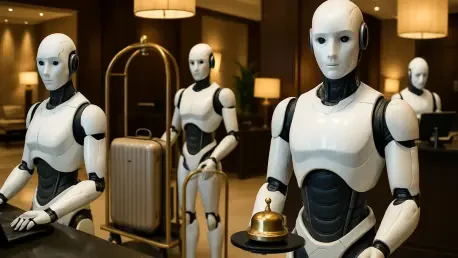In recent years, humanoid robots have begun changing the face of the hotel industry globally. This shift is largely driven by the increasing need for contactless services and the ongoing battle against rising labor costs. More and more hotels are implementing robotic technology for tasks previously managed by humans, such as check-ins and room service. This analysis aims to understand the significant trends and future projections of this evolving sector, seeking to uncover how this transition shapes the collective hotel guest experience and industry efficiency.
Explaining the Shift: Historical and Technological Development
The evolution of automation in hospitality signifies a departure from its traditionally human-centered foundation. This transformation is powered by strides in artificial intelligence and robotics, which lay the groundwork for the present use of humanoid robots in hotels. The integration of these high-tech aides marks a crucial phase in hospitality’s technological journey, illustrating how past innovations have prepared the field for this shift. By following this historical path of progress, the current narrative of automation becomes more comprehensive.
Dissecting Market Trends: From Enthusiasm to Apprehension
Enhancing Efficiency with Robotic Aid
Robotic integration offers tangible benefits, especially in enhancing efficiency within hotel operations. Notable chains like Marriott and Hilton exemplify this trend, having successfully incorporated robots into their services. Market predictions highlight a robust expansion of the robotic hospitality sector, anticipating growth from $648.2 million to $2.2 billion by 2030. While these advancements promise reduced wait times and reliable service, mixed guest feedback presents some hurdles. Approximately 61% of patrons report favorable experiences, yet a notable fraction expresses unease.
Confronting the Uncanny Valley
One challenge confronting the industry is the “uncanny valley” phenomenon, where robots’ nearly human appearance triggers discomfort. This issue gained attention through viral moments, such as interactions at the Henn-na Hotel in Tokyo. Addressing this discomfort requires firms to craft solutions blending cutting-edge technology with elements promoting guest comfort. Design improvements are necessary to reduce these adverse reactions, ensuring robots are perceived as helpful rather than unsettling.
Global Perspectives: Adoption Varies Across Markets
The embrace of robotics in hospitality shows regional differences, with economically developed areas taking the lead due to higher labor costs. In contrast, regions with lower labor expenses may prioritize human workers over machines. Experts stress that the true transformative power lies in AI-driven technology operating behind the scenes. These tools can boost efficiency without detracting from the essential human touch inherent in hospitality, although care must be taken to dispel fears of humans being replaced by machines.
Navigating the Future: Technological Horizons and Strategic Approaches
The hospitality industry stands on the cusp of additional advancements, forecasting continued refinement in robot deployment. Anticipated improvements in AI abilities will offer bespoke guest experiences and seamless service integration. Economic factors, along with regulatory changes, will dictate the specific uses of robots in hotels, requiring a strategy that values both technology and personal interaction. Prioritizing harmony between these aspects will likely shape the industry’s trajectory.
Strategic Insights: Lessons and Application
As robotic technology becomes ever more integrated into the hospitality sector, businesses must employ deliberate strategies to optimize its potential. A key focus should be on merging the efficiency of machines with the personalized services guests have come to expect from human staff. Adopting this practice could offer guests a distinctive fusion of advanced technology and personal attention. Training hotel personnel to effectively work alongside robots will ensure these changes are seamless, upholding high service standards.
Considerations for the Hospitality Industry’s Evolving Landscape
The integration of humanoid robots in hotels marks a turning point, combining technological advancements with the indispensable human touch. The findings from this industry transformation underscore the need for a thoughtful balance between automation and personalized interaction. Successfully navigating this blend is crucial for meeting the challenges posed by an evolving market. Embracing these changes presents opportunities to improve service quality while maintaining efficiency, essential in a tech-driven hospitality landscape.









